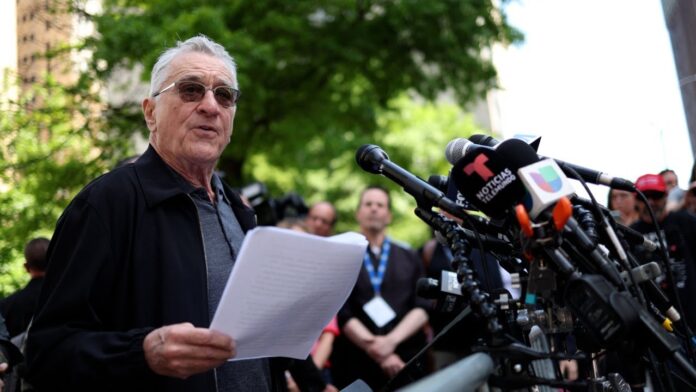Biden’s campaign enlists actors to criticize the former president as the jury deliberates
US President Joe Biden’s campaign took a dramatic turn in Donald Trump’s hush money trial by enlisting Hollywood actor Robert De Niro to criticize the former president outside the courthouse. As closing arguments commenced on Wednesday, De Niro appeared in Lower Manhattan, accompanied by police officers who defended the US Capitol during the January 6 riots.
De Niro described Trump as a “tyrant” who New Yorkers tolerated “when he was just another grubby real estate hustler masquerading as a big shot two-bit playboy.” The actor, a native of Manhattan, warned voters about the potential dangers of a second Trump presidency. “People thought they could control Hitler, thought they could control Mussolini, it didn’t happen,” De Niro stated. “A dictator is a dictator, and that’s what Trump wants to do and be.”
This marked the first significant attempt by the Biden campaign to leverage Trump’s legal troubles directly. While Biden has been hesitant to comment on the trial to avoid allegations of political interference, De Niro’s presence signalled a shift in strategy. Biden’s reluctance stems partly from concerns over his own son Hunter’s legal issues, including an upcoming federal gun charge trial.
Polls indicate Biden trailing in key battleground states, with voter discontent over issues like the Gaza conflict, the border crisis, and Biden’s age. These factors prompted the Democrats to recalibrate their approach, leading Trump’s team to respond vehemently. “What you just heard from is a desperate and failing and pathetic campaign who knows that they are losing,” said Trump spokeswoman Karoline Leavitt. “It is a full-blown concession that this trial is a witch hunt that comes from the top.”
As closing arguments unfolded, people queued for hours to secure a seat in the courtroom. The former president faces 34 counts of falsifying business records related to a $130,000 payment his former lawyer, Michael Cohen, made to silence an affair with porn star Stormy Daniels. Prosecutors allege Trump directed the payment to avoid a scandal that could have jeopardized his 2016 presidential campaign. They claim Trump reimbursed Cohen while in office, disguising the payment as a legal retainer.
Defence lawyer Todd Blanche countered these claims, asserting the payments were legitimate fees for Cohen’s legal services, with no intent to defraud. “There was no conspiracy to influence the 2016 election,” Blanche insisted. He also emphasized Cohen’s credibility issues, calling him “the embodiment of reasonable doubt,” and depicted Daniels as someone profiting from her association with Trump.
Prosecutor Josh Steinglass, however, emphasized the case’s core as a “conspiracy and a cover-up,” beginning with a 2015 meeting between Trump, Cohen, and National Enquirer editor David Pecker. Steinglass argued that their plan to bury damaging stories about Trump helped secure his election. He described the National Enquirer as a “covert arm” of Trump’s campaign.
Trump’s defence has consistently denied wrongdoing. Prosecutors presented evidence including 11 checks, 12 ledger entries, and 11 invoices used to pay Cohen in 2017, with funds coming from the Trump Organization and personal accounts. This trial is one of four criminal cases Trump faces, but it’s the only one proceeding before the November 5 election.
If convicted on all counts, Trump could face up to four years in prison, though Judge Juan Merchan might impose a lesser sentence or probation. Alternatively, a hung jury or acquittal could result if jurors are not unanimous or find him not guilty.
As the jury took a break, Trump posted “BORING!” on his Truth Social site. After five hours of prosecution arguments, the jury was dismissed for the night and will receive instructions before deliberating on Thursday.
Analysis :
Robert De Niro’s involvement in Donald Trump’s hush money trial represents a bold strategy by the Biden campaign to sway public opinion. By leveraging a high-profile celebrity’s voice, the campaign aims to highlight Trump’s alleged misconduct and draw attention to the broader implications of his potential return to power.
Politically, this move underscores the Democrats’ attempt to energize their base and address Biden’s declining poll numbers. De Niro’s fiery rhetoric serves to frame Trump as a clear and present danger, drawing historical parallels to infamous dictators. This strategy may galvanize voters who are wary of another Trump presidency.
Economically, the trial and its high-profile coverage impact Trump’s brand and business interests. Negative publicity could affect his business dealings and financial standing, particularly if convicted. Conversely, Trump’s supporters might rally financially, contributing to his legal defence fund and campaign, showcasing the polarized economic effects of his legal battles.
From a sociological perspective, De Niro’s comparison of Trump to historical dictators resonates deeply, especially among those who view Trump’s actions as threats to democratic institutions. This narrative reinforces concerns about authoritarianism and the importance of checks and balances in governance.
Gender and representation issues also surface in this trial. The involvement of Stormy Daniels highlights the intersection of politics, gender, and power dynamics. The defence’s portrayal of Daniels as financially motivated underscores ongoing challenges women face in being taken seriously when accusing powerful men.
Locally, the trial is a significant event for New York City, drawing national and international attention. It underscores the city’s role as a battleground for high-stakes legal and political confrontations. For residents, the trial’s outcome could influence local perceptions of justice and accountability.
In conclusion, De Niro’s appearance at Trump’s trial encapsulates the multifaceted nature of this high-profile legal battle. It intertwines political strategy, economic ramifications, sociological concerns, and gender dynamics, reflecting the complex landscape of contemporary American politics and society.
